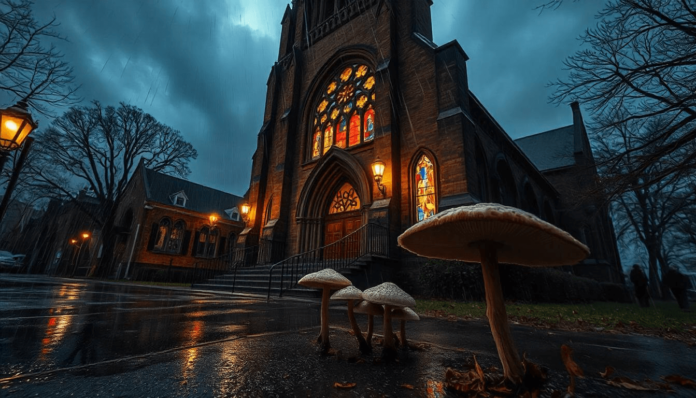The use of psychedelic substances within spiritual practices has been a topic of contention in various parts of the world. In Detroit, this issue has come to the forefront with the legal battles surrounding Soul Tribe International Ministries, a nondenominational church that incorporates psychedelic mushrooms into its Holy Communion.
A clash with city laws
Robert Shumake, the head of Soul Tribe International Ministries, has been embroiled in a lengthy legal dispute with the city of Detroit. The city argues that the church is a nuisance and should be closed down, whereas Shumake maintains that his religious rights are being infringed upon. According to him, the use of psychedelic mushrooms is an integral part of his practice of Shamanism, which he seeks to share with others.
In September, the city sought to finalize the shutdown of the church, contending that Shumake had no right to sell these mushrooms to individuals. This led to Shumake filing a lawsuit against the city, claiming that his constitutional rights were being violated by forcing the closure of a religious institution that once boasted 150 to 200 members.
Legal and political implications
At the heart of this battle is whether Soul Tribe International Ministries is adhering to the proposal that Shumake himself helped bring to the ballot in December 2021. This proposal decriminalized the possession and use of entheogenic plants, including psychedelic mushrooms, making them the lowest law enforcement priority under city ordinance. However, it doesn’t permit the commercial growth or sale of these mushrooms to residents.
The city’s ordinance emphasizes therapeutic use under professional supervision, but does not make clear allowances for non-supervised religious uses. This distinction has become a key point of contention between Shumake and city officials.
The transformative journey
Shumake’s interest in bringing psychedelic experiences to Detroit stems from his personal transformation after a trip to Costa Rica where he participated in ayahuasca ceremonies with local shamans. This profound experience motivated him to introduce similar rites back home through Soul Tribe International Ministries.
Before setting up the church, Shumake had deep roots in spirituality, having grown up in a religious family with parents who were pastors. The death of his younger brother when he was nine shattered his family, marking a period where business ventures took precedence over spiritual pursuits. Founding the church represented a return to those spiritual foundations, with the aim of helping individuals seeking emotional and mental clarity.
A growing community
Since the proposal’s passage in 2021 until the church’s recent closure, approximately 200 people became members and attended services. These services emphasize the renewal of the mind through the sacred plant, promoting a new conversation about oneself and rediscovery.
Members of the congregation typically participate in overnight services lasting around eight hours, during which they consume psilocybin mushrooms as part of their sacrament. The services offer a chance for attendees to reflect deeply, often resulting in life-changing realizations.
Navigating legal gray areas
While Soul Tribe International Ministries finds itself at odds with Detroit authorities, it’s not alone in facing such challenges. Across the United States, other churches using entheogenic plants have similarly fought for their religious freedoms. Cases involving churches in New Mexico and Oregon ultimately resulted in favorable rulings from the U.S. Supreme Court, granting them the right to use psychoactive substances like ayahuasca.
However, many communities practicing similar rituals remain in a legal gray area, either operating underground or awaiting formal legal recognition. Jeffrey Breau from the Harvard Center for the Study of World Religions notes that only a few religious groups have secured federal approval to use psychedelics as sacraments, adding complexity to an already contentious subject.
Religious freedom versus public safety
The debate surrounding Soul Tribe International Ministries highlights broader tensions between the exercise of religious freedoms and concerns over public safety and legality. While proponents argue that such spiritual practices offer significant psychological benefits, opponents worry about the potential misuse and societal impact of widespread psychedelic use.
For adherents like Shumake and other members of his church, the transformative power of these substances cannot be overstated. They report experiencing profound insights and emotional healing, underscoring the importance of integrating these elements into their spiritual lives. Yet, navigating the intricate maze of legal regulations remains a formidable challenge.
A vision for the future
As the legal proceedings unfold, the future of Soul Tribe International Ministries hangs in the balance. Regardless of the outcome, this case underscores a critical dialogue on the evolving relationship between spirituality and substance use. Advocates hope to achieve a legal framework permitting responsible and supervised use while ensuring that fundamental rights are respected.
Detroit’s experience may well serve as a precedent for other cities grappling with similar issues, reflecting a broader trend towards reevaluating the role of psychedelics in modern society. With ongoing debates and diverse perspectives, this topic continues to captivate both legal experts and the general public alike.


